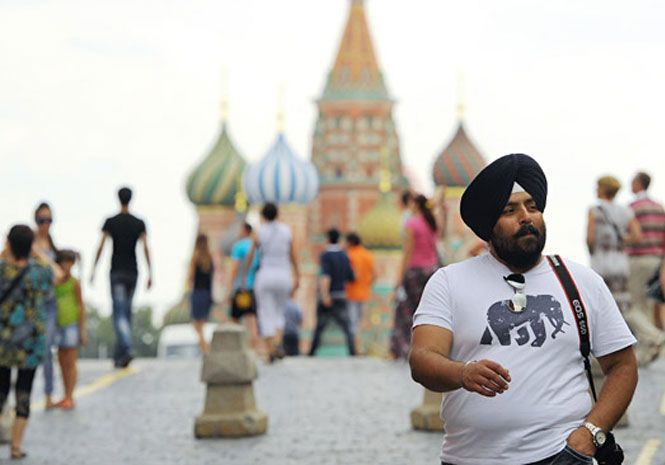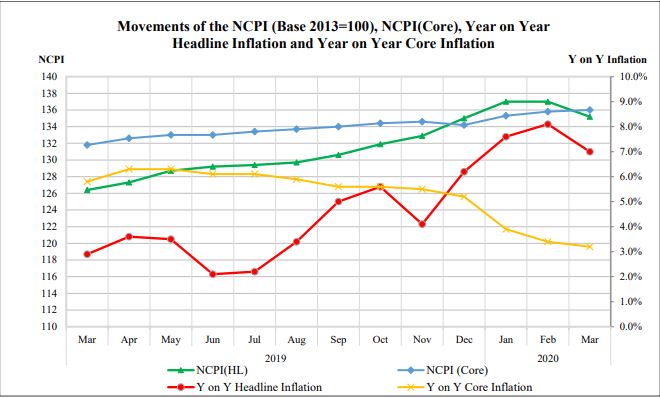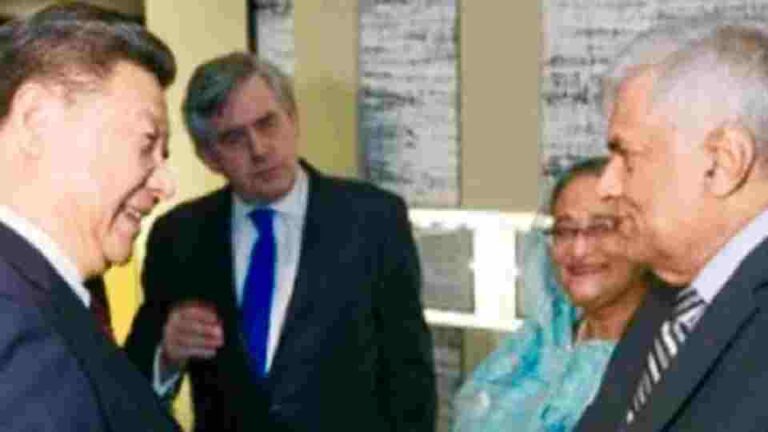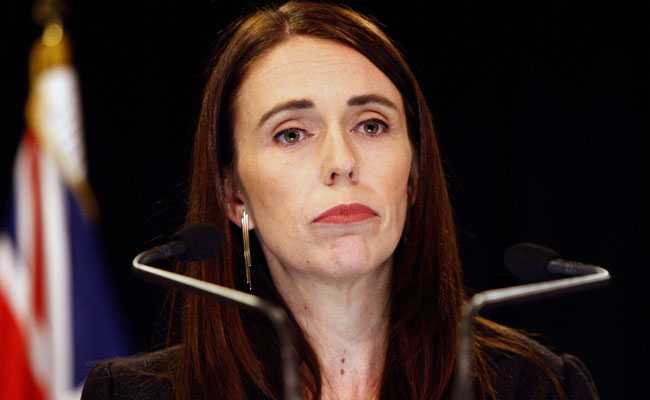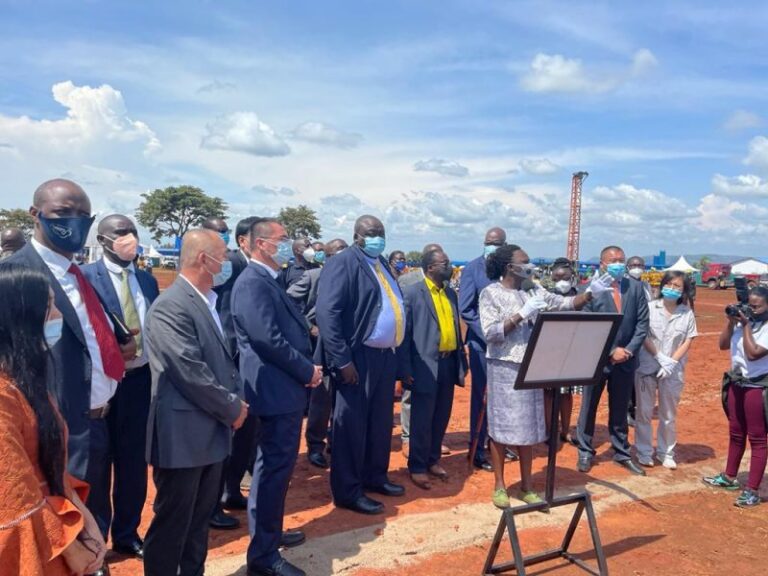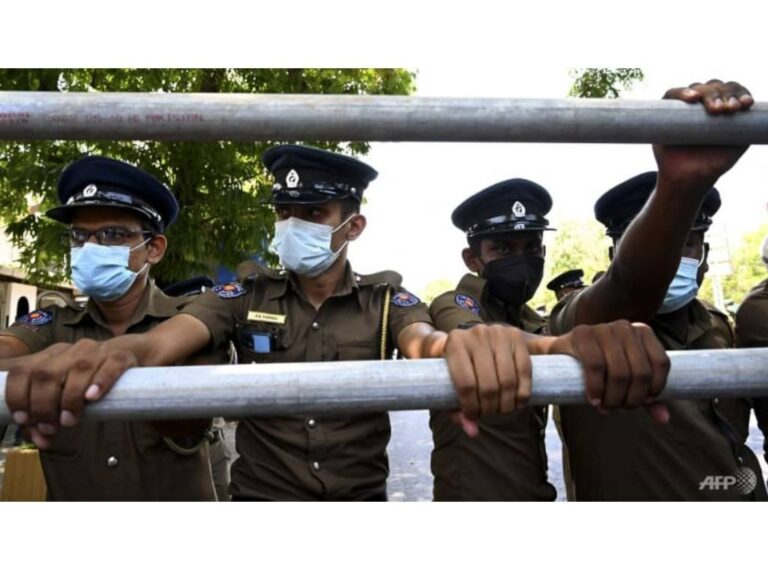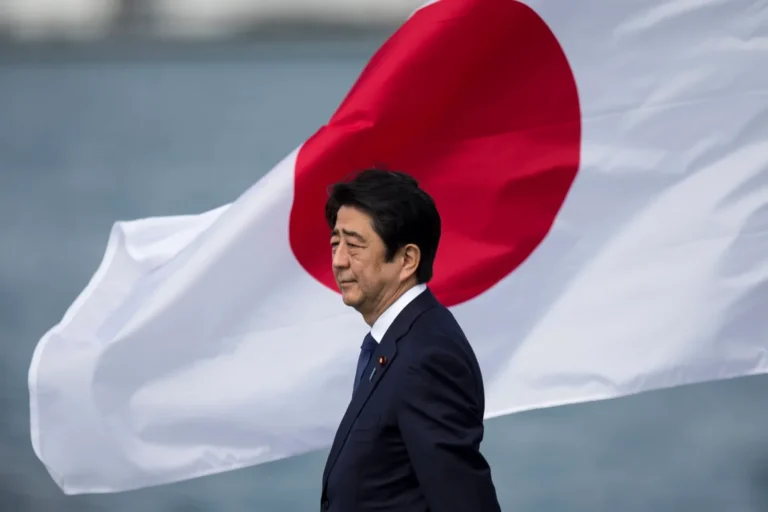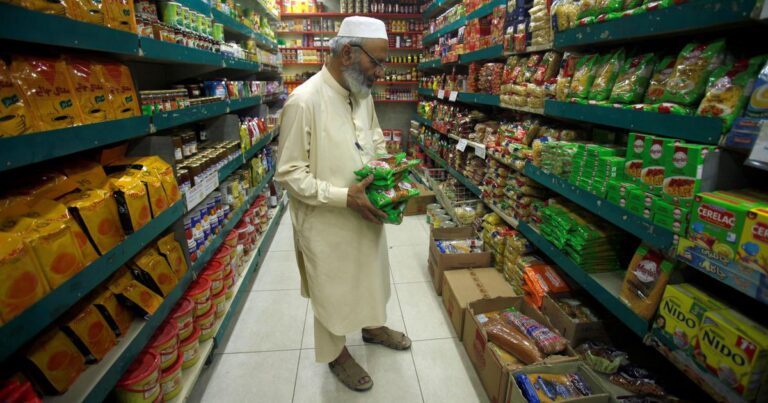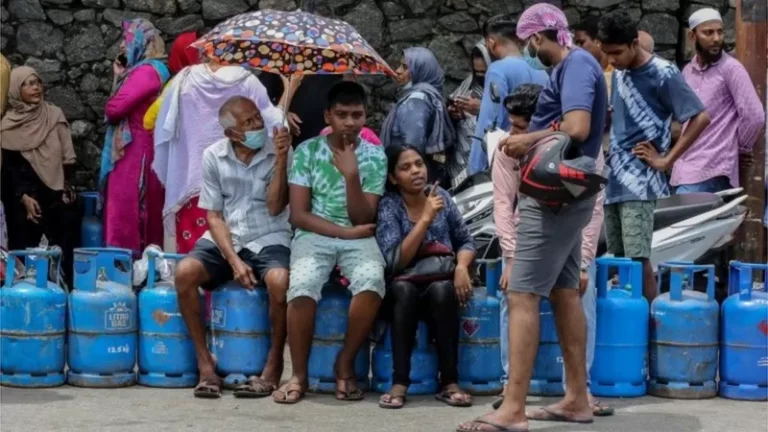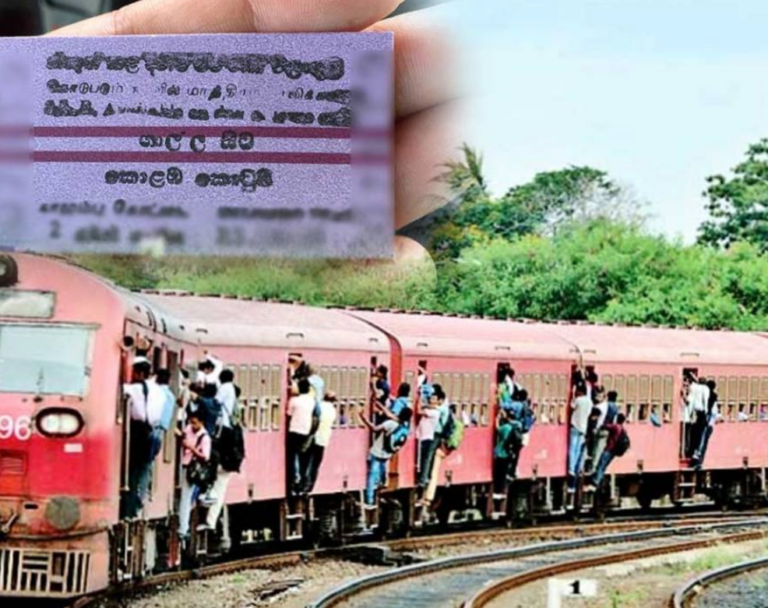Sri Lanka plans to tap Indian tourists to revive the South Asian island’s battered tourism sector and shore up its depleted foreign exchange reserves.
Authorities will hold roadshows starting next month in five Indian cities to attract travelers seeking “wellness, leisure, and Ramayana-trail,” tours, corporate functions and destination weddings, said Harin Fernando, the South Asian island’s tourism minister. Ramayana is the mythological life story of the Hindu god Ram.
“We believe that Indian tourists will be very important for us in the short term,” he said in a virtual conference with reporters Wednesday.
The worst economic meltdown since independence, coupled with political turmoil, has hurt the nation’s tourism sector, that’s been a key driver of foreign currency inflows. Sri Lanka’s forex pile has dwindled to a meager $1.89 billion in May even as it needs nearly $6 billion in the next few months to tackle shortages and support its currency.
The South Asian nation is banking heavily on multilateral institutions, including the International Monetary Fund, and friendly countries, for aid to tide over the crisis. Neighboring India, so far, has extended $3.5 billion of support in the last few months.
Chennai, Bangalore, Hyderabad, Mumbai, and New Delhi have been picked for the roadshows, Fernando said, adding that the bankrupt nation hopes to attract about 1 million tourists in 2022. Sri Lanka welcomed a peak of around 2.5 million tourists in 2018 before the Easter Sunday terror attacks dried up arrivals.
The government was scheduled to secure more oil supplies by next week, including adequate jet fuel to ensure international airlines continue to fly to the nation, and hoped that it may also prompt the UK government to reverse a recent travel advisory on Sri Lanka, Fernando said.
Government plans to tap Indian tourists to revive tourism
Sri Lanka’s headline inflation to hit 70% in coming months
Sri Lanka’s headline inflation is expected to rise to 70 per cent in the coming months from the current level of 50%, the Governor of the Central Bank of Sri Lanka, Dr. Nandalal Weerasinghe says.
His remarks came during a media briefing convened in Colombo to announce the Central Bank’s 5th monetary policy review for the year 2022.
The major concern and priority, from the Central Bank’s point of view, is to address inflation and inflation expectations going forward and bring it down to a reasonable level as soon as possible, Dr. Weerasinghe said. “If you look at the impact of inflation on segments of people, the first and hardest hit would be the poor and vulnerable.”
If inflation goes beyond control, to a hyperinflation situation, no one will be able to continue businesses, he added.
On Wednesday (July 06), the Monetary Board of the Central Bank further increased its policy interest rates with the aim of containing inflation pressures while ensuring macroeconomic stability in the period ahead.
Accordingly, the Standing Deposit Facility Rate (SDFR) and the Standing Lending Facility Rate (SLFR) were increased by 100 basis points 14.50 points and 15.50 per cent, respectively.
In arriving at that decision, the Monetary Board weighed the impact of tighter monetary conditions on overall economic activity including the micro-, small- and medium-scale enterprises and the financial sector performance among others against far-reaching adverse consequences of any escalation of price pressures across all sectors of the economy in the near term.
According to the Central Bank, in June headline inflation was at a record high of 54.6 per cent, driven mainly by inflation in groups such as transport, restaurant and hotel, food and non-alcoholic beverages. In the month of June, overall food inflation was recorded at 80.1 per cent, while non-food inflation was at 42.4 per cent.
The Central Bank noted that the major factors that contributed to the unprecedented high-level acceleration in headline inflation were the global energy and food price hikes and associated passthrough to domestic prices, domestic supply side disruptions along with the impact of the depreciation of the rupee, tax adjustments and the lagged impact of monetary accommodation.
In the near term, there will be some acceleration in headline inflation until the end of this year, the CBSL said, adding that however, a significant deceleration is expected starting from the beginning of the year 2023. Headline inflation will reach the medium-term level of 46 per cent range by 2025.
This will be facilitated by both global and domestic developments. Major global developments will include a downward trend of food inflation and oil prices, the Central Bank said further. This has to be supported by appropriate policy measures form the local authorities including monetary and fiscal tightening that will subdue aggregate demand pressures in the period ahead, it added
PM Ranil should not be the fall guy for putting his neck out
Has China got hostile towards SL? What is the PM doing?
Sri Lanka is facing its worst performing cultivation season in more than a decade during the ongoing Yala season and there is a possibility of a looming food crisis in the coming months. This is largely due to the President’s failed fertilizer experiment. Today the country has no USD to even import the minimum fuel and gas required to meet the demands of the public. The Diesel shipments are slowly falling into place with the partial liberalization, but may take months to bring it back to some normalcy. The petrol supply has gone from bad to worse. Whilst CPC is begging from all the banks for liquidity.
LANKA IOC is constrained because the country has no forex liquidity to give them to import. The prime minister who took over the responsibility of brining some normalcy back, has become the fall guy for the opposition. Meanwhile no one knows how the JVP or Premadasa is going to resurrect the dying economy, that needs a $ 300 Million monthly infusion from overseas . Some analysts say the Chinese have promised that if there is a regime change they will assist with bridge finance.
Questions are being asked as to who is funding the JVP protests and if it is to derail the IMF program? Perhaps this is the reason the US Ambassador said in a statement that the US and the international community is fully focused on assisting people of Sri Lanka irrespective of who is President or Prime Minister or which party is governing.
CBSL Screwups
It is very obvious to the writer that the country was run to the ground due to the incompetence of the Central bank . The CBSL made the cardinal mistake of defending the LKR and wasted nearly 5 Billion USD importing non essentials . Next they stopped the ongoing IMF program . Knowing very well tourism income of $4.5
Billion had almost disappeared due to the pandemic , neither did they reach out for the IMF emergency financial assistance.
Next the CBSL floated the LKR resulting in the lKR losing 50 % of the value overnight causing economic mayhem. The new Governor who was in the CBSL for over 30 years who is part of all these problems made bridge financing near impossible by defaulting on a paltry $78 million knowing very well the government was negotiating a SWAP deal of over 1 Billion USD . This was not to the liking of the Chinese government. Further the CBSL increased interest rates by 100% , wrongly assuming LKR was driving up inflation . When it was the USD illiquidity that was driving up inflation . As someone pointed out Nandalal Weerasinghe is running the economy using an AL economic text book . The Prime Minister in frustration said the CBSL was making Sri Lanka the next North Korea. It is the President who insisted and appointed Nandalal as Governor and gave him a six year term. The Prime minister unfortunately has to now carry the dead weight of the CBSL and face the consequences of their decisions . The CBSL claims our reserves are $1.8 Billion .
However our usable reserves are around $300 million. Educated people are now saying if the Central Bank is shut down for six months the country will recover very much faster and Businesses are saying the CBSL has become an impediment for recovery . By further tightening the monetary policy by jacking up interest rates the CBSL will destroy the livelihoods of 4.5 million people , because no business can make profits servicing interest of over 25% . Analyst say the monetary board lacks proper expertise or industry exposure. Unfortunately the Aragalya stalwarts say the Prime Minster has no plan and he must resign .
On the other hand Businessman Dhamika Perera also wants him to resign, because he delayed a Cabinet paper of his ministry . Businessman Perera is yet to learn how fast the government works. The reality is even if god takes over tomorrow, unless a magic wand is waved the Sri Lankan people will have to stomach a lot of pain and sallow several bitter pills for the economic mismanagement of Dr PB Jayasundara and SR Attygalle, ably led by President Gotabaya who always claimed he was doing a marvelous job . Both Jayasundara and Attygalle still remain at large with no action being taken against them. Why is the opposition protecting them? Ranil Wickramasinghe the last man standing on the deck is taking the flack for speaking the truth and for not fixing the economy in 4 weeks, when even the experts say country needs a minimum of 2 years to bring it back any kind of stability . The Prime Minister is not the most popular man, however we would still put our bets on the man provided he is given the room to take decisions and does not surround himself with the wrong people and crony businessmen.
Adolf
‘The world is bloody messy’: Jacinda Ardern urges end to ‘black-and-white’ view of global conflict
The world is “bloody messy” but must take a step back from polarisation and black-and-white approaches to conflict, Jacinda Ardernhas said in a wide-ranging speech in which she addressed the war in Ukraine and rising tensions with China.
In a speech to foreign policy thinktank the Lowy Institute in Sydney, the New Zealand prime minister decried Russia’s “morally bankrupt” war in Ukraine – but also argued against the hardening of alliances, saying that the war should not be presented as a conflict of “democracy v autocracy” or be seen as an inevitable direction for other tensions between competing nations.
“In taking every possible action to respond to Russia’s aggression and to hold it to account, we must remember that fundamentally this is Russia’s war,” she said.West must stand firm as China challenges ‘rules and norms’, Ardern tells Nato
“And while there are those who have shown overt and direct support … who must also see consequences for their role, let us not otherwise characterise this as a war of the west vs Russia. Or democracy v autocracy. It is not.
“Nor should we naturally assume it is a demonstration of the inevitable trajectory in other areas of geostrategic contest.”
While Ardern cited Belarus as an example of a country that had shown Russia support, her comments also gestured at China’s failure to condemn Russian aggression, and the prime minister dedicated much of her speech to the question of China’s role in the Indo-Pacific, again arguing against hardening alliances, and calling for dialogue and cooperation.
“In the wake of the tensions we see rising, including in our Indo-Pacific region, diplomacy must become the strongest tool and de-escalation the loudest call. That won’t succeed, however, if those parties we endeavour to seek to engage with are increasingly isolated and the region we inhabit becomes increasingly divided and polarised,” Ardern said.
Over the past year, New Zealand has come under pressure to clarify its position on China’s increasingly muscular presencein the Pacific, particularly after Beijing signed a secretive bilateral security pact with Solomon Islands, and sought a regional agreement with other Pacific nations.
New Zealand has made some incremental shifts toward its harder-line western partners, including joining the US-driven Blue Pacific pact, and joining UK military exercises in the South China Sea. But New Zealand – which is heavily reliant on China for trade – is still trying to walk a middle road, with Ardern saying it would seek to cooperate with Beijing on shared interests, and emphasising Pacific nations’ right to make autonomous decisions on their partners and allies.
“Even as China becomes more assertive in the pursuit of its interests, there are still shared interests in which we can and should seek to cooperate,” she said.
“The honest reality is that the world is bloody messy. And yet, amongst all the complexity, we still often see issues portrayed in a black and white way,” she said. “We must not allow the risk of a self-fulfilling prophecy to become an inevitable outcome for our region.”
She also called for countries not to become myopically focused on military security, and miss the major threat that climate change and economic fragility posed to the Pacific.
“While we all have a concern – and rightly so – about any moves towards militarisation of our region, that must surely be matched by concern for those who experienced the violence of climate change,” she said.
“What happens in the Indo-Pacific Region impacts our entire neighbourhood. It follows that we must strengthen the resilience of the Indo-Pacific through relationships, and importantly, economic architecture.”
As she charted New Zealand’s approach to trying to pursue “independent foreign policy” as a small player in an intensely pressured environment, Ardern re-articulated the country’s commitment to multilateral institutions – but also reflected on their recent failures. There was “no better example of that than the failure of the UN to appropriately respond to the war in Ukraine because of the position taken by Russia in the security council”, she said, describing it as “a morally bankrupt position on their part, in the wake of a morally bankrupt and illegal war”.
Ardern is visiting Australia on the tail end of a trip to Europe, where she spoke at the Nato summit, finalised a free trade agreement with the EU and held a series of bilateral talks with leaders including Boris Johnson. In Australia, she will hold further talks with her counterpart Anthony Albanese that are expected to include conversations about China, the challenge of climate change in the Pacific, trade between the two countries and the rights of New Zealand citizens residing in Australia.
Uganda finds 31 mt of gold ready to be mined; signs up Chinese firm
In a move that could overhaul its economy, Uganda has discovered 31 million tonnes of gold following a series of surveys. The gold can be mined with immediate effect. The country now looks forward to attracting gold miners and investors.
The Ugandan government has already licensed Chinese firm Wagagai Gold Mining Company to start production in Busia district.
A tweet posted by the Uganda Investment Authority read: “Ground breaking ceremony of Busia’s gold mine project, largest gold deposit so far quantified in Uganda estimated @ 12.5 tonnes of mineable gold, investor Wagagai’s initial investment is USD50 million, 3,000 direct jobs.”
Over 3,000 jobs to be generated
According to the Ugandan government, the value of 31 million tonnes of gold ore stands at $12.8 trillion. The tweet said refining gold locally can lead to the generation of 3,000 direct jobs and other opportunities. The government predicts that local mining can boost the country’s economy in a big way.
Also Read: India recycled 75 tonnes of gold in 2021, China world’s top recycler
As per reports, Ugandan President Yoweri Museveni has called for the local refinement of the discovered gold, calling any external refinery ‘criminal’.
The President said: “It is criminal for anybody to argue for the continued exports of raw materials in Africa when there is 90% more value in that product that you are giving to the outsiders.”
Quoting the general manager of Wagagai, media reports said the company’s investment has reached $60 million. The company faced a delay in construction as it needed two licences – a gold production license it obtained in March and a 21-year lease to mine gold in the country.
Chinese firm begins work
As per reports, the Chinese firm has invested $200 million in constructing a refining facility. According to the spokesperson of the Ministry of Energy and Mineral Development, Solomon Muyita, the Chinese-run firm expects to mine and start refining around 5,000 kg of gold a day in Busia by the end of the year.
Uganda’s gold exports have reportedly been on the rise since the opening of the Africa Gold Refinery in Entebbe. Pointing to six local gold refineries, the President has said that the time for Uganda to ship unprocessed raw gold exports is at its end. The Africa Gold Refinery in Entebbe was sanctioned by the US over alleged illicit gold sourcing.
THE FEDERAL
6292 police officers summoned to Colombo
Tomorrow is the decisive day of the protest that has started demanding the resignation of the President and the government. Thousands of people who support the nationwide protest for that are already ready to come to Colombo.
Meanwhile, the police have started a special security program in the city of Colombo from tonight. For that, 6292 police officers have been called to Colombo.
According to a letter sent by the Inspector General of Police to the Deputy Inspector General of Colombo District, this police battalion operates under 08 Deputy Inspector Generals. It includes 24 Senior Superintendents of Police, 86 Superintendents of Police, 392 Chief Inspectors/Inspectors/Sub-Inspectors. 200 female police constables have also been called for security purposes.
In addition, it is reported that a thousand soldiers of the Civil Defense Force and military teams have also been called.
Shinzo Abe: former Japan prime minister confirmed dead after being shot
Japan’s former prime minister Shinzo Abe has died in hospital after he was shot at a political campaign event, say local media.
Mr Abe was shot at twice while he was giving a speech in the southern city of Nara on Friday morning.
He immediately collapsed and was rushed to the nearest hospital. Pictures taken at the scene showed him bleeding.
Security officials at the scene tackled the gunman, and the 41-year-old suspect is now in police custody.
In an emotional press conference earlier, prime minister Fumio Kishida told reporters that Mr Abe was in a “very grave condition”.
In many ways, Pakistan is following in the footsteps of bankrupt Sri Lanka
Pakistan’s current economic struggles exemplify the little fires everywhere set alight across the global economy by a war during a pandemic. Like others in countries dependent on imported commodities – for example, Ghana and Sri Lanka – Pakistanis are seeing food and fuel prices soar. Foreign exchange reserves – used to pay for imports such as food and fuel – have shrunk.
Pakistan is using up its foreign exchange reserves more quickly than previously anticipated because prices of foreign goods are going up. If the situation does not change, the country faces bankruptcy.
In April, a litre of petrol cost about 150 Pakistani rupees, but by July 1 the price had risen to nearly 250 Pakistani rupees. And the price of cooking oil increased by 40% just between May and June. At present, the country has only enough foreign currency to pay for five weeks of imports. Pakistan is heavily dependent on imported fuel and cooking oil, but also on machinery and food grains from overseas.
All of this has made day-to-day activities more challenging. Power outages are not uncommon in the country, even when the economy is strong – they become frequent and long when the economy is under duress.
This happens because energy companies struggle to operate when the costs of power generation are higher than the revenue they collect. Over the past few weeks, residents of major cities have had to go without electricity in their homes for as much as 10 hours a day – in rural areas for even more. The discomfort of the public is compounded by an intense heatwave in many parts of South Asia that has caused temperatures in some places to hit 51 degrees Celsius.
Relying on imports
Foreign exchange reserves with the Pakistan central bank currently stand at $10.3 billion. This is a sharp drop from $16.6 billion in January. Though recently bolstered by Chinese bank lending, reserve levels have been volatile since late April, when a political crisis resulted in the ousting of Prime Minister Imran Khan.
In Pakistan, imports are far higher than exports. To preserve foreign currency, an early measure taken by the newly appointed government in May was to ban many types of imported goods deemed non-essential luxury items.
The list included chocolate, nappies, pet food and tampons, but has been amended. Initially, there were concerns that pets and livestock would be malnourished because of this ban, and that chocolate would be confiscated at international airports. And that menstruating womenwould not have access to sanitary pads.
Because of public pressure, the list has been amended and clarified. Chocolate is no longer being seized, pet food taken off the list and sanitary pads are being manufactured domestically.

A more recent intervention, intended as a placid nudge but widely derided, is a cabinet minister’s suggestion that individuals should drink fewer cups of tea. The drink is ubiquitous in Pakistan, which is the largest global importer of tea by a considerable margin. It is considered one of life’s simple pleasures in a country troubled by power outages and expensive basic food items.
Consternation over the petty politics of “austeri-tea” can deflect from larger, more compelling issues. These are recurrent and arise from the position of Pakistan, and other fragile, externally indebted economies in a global system of currency hierarchies.
Poor countries cannot borrow in their own currency, but need to use one of the major currencies being traded on the international exchanges. The US dollar is the most used currency, while other dominant currencies include the British pound and the euro.
These “hard” currencies are those which indebted countries must regularly purchase to pay for imports and to repay and service the loans they owe to private bondholders, international financial institutions and lenders.
Before he was ousted, Khan tried to retain public support as prime minister by resisting demands from the International Monetary Fund to increases taxes and remove subsidies. So, by not taking steps such as making fuel more expensive, the Khan government delayed inflows of external finance. This weakened Pakistan’s reserves and made it difficult to maintain the value of the Pakistani rupee. As the chasm between the dollar and rupee grew, the popularity of the government fell.
Global sanctions on Russia and Iran complicate Pakistan’s economic situation. Khan was frustrated at not being able to use a supply of relatively cheap Russian oil because of international pressure over Ukraine. Given the need for drastic measures, Pakistan’s government may now follow in the footsteps of Sri Lanka and turn to Russia for cheap fuel.
International tensions
Pakistan has also refrained from importing oil from neighbouring Iran. Smuggled Iranian oil remains attractive to those living near the border. Fuel and energy cooperation between Pakistan and Iran is an especially prickly issue given opposition from the US and Saudi Arabia, another nation that has often financially assisted Pakistan.
To avert bankruptcy – and to continue buying food and fuel – Pakistan is now awaiting assistance from the International Monetary Fund. This Washington DC-based institution has rescued crisis-ridden economies on many occasions. In exchange, recipient governments must commit to policy reforms, that are often unpopular with the public.
Over the next few weeks, the IMF is likely to step in and commit to a bailout of approximately $1.85 billion. If, and when, this happens, the exchange rate between the Pakistan rupee and the US dollar will stabilise.
Given that the dollar has risen more than 15% against the Pakistani rupee since January policy makers will welcome a stronger Pakistani currency to calm surging prices.
But the heavy costs of a deal with the IMF have already driven a cost-of-living crisis as fuel subsidies have been sharply withdrawn and made food and transport unaffordable for many. Tax increases have also added to day-to-day pressures.
Currency issues and cost-of-living crises in Pakistan are inextricably linked. A more expensive dollar makes fuel more expensive, and these price increases are quickly reflected in daily essentials. Given that Pakistanis spend more than 40% of their income on food, inflation makes large segments of the population marginalised and vulnerable.
Unless exports drastically increase in the coming years, Pakistan’s economy will remain precarious and high prices will remain a threat. Given this situation, financial assistance is the only way to overcome crises. Unfortunately, this tends to come with financial or political strings attached.
Sri Lanka crisis: Daily heartbreak of life in a country gone bankrupt
In Sri Lanka right now, before you’ve woken up, you’re losing.
Power cuts that run late into the sweltering nights steal hours of sleep as the fans cease; whole families waking up sapped from the months-long trial of shuffling their lives around daily blackouts after the country went bankrupt and essentially ran out of fuel.
There are long days to be lived; work days, errands to be run, daily essentials to be bought at twice the price they had been last month.
All this, you’re starting a little more broken than you were last week.
Once you’ve had breakfast – eating less than you used to, or perhaps nothing at all – the battle to find transport beckons.
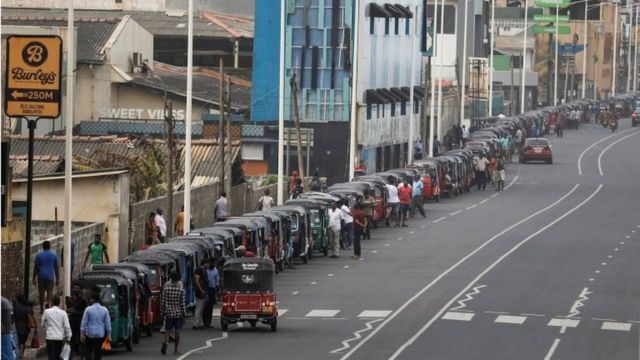
In the cities, fuel queues curl around entire suburbs like gargantuan metal pythons, growing longer and fatter by the day, choking roads and crushing livelihoods.
Tuk-tuk drivers with their eight-litre tanks are forced to spend days lining up before they can run hires again, for 48 hours perhaps, before they are forced to rejoin the queue, bringing pillows, changes of clothes and water to see them through the ordeal.
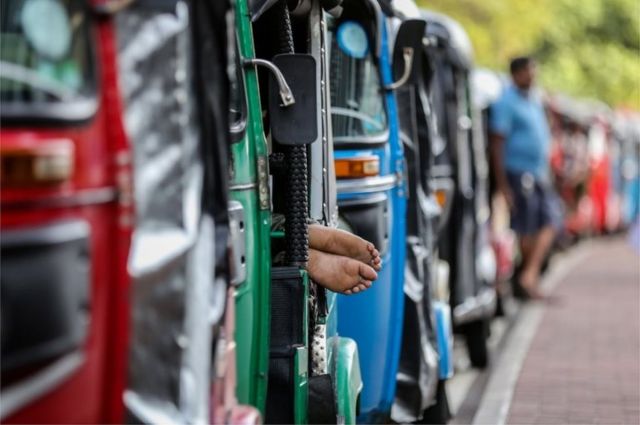
For a while, middle- and upper-class folk had brought meal packets and soft drinks for those queuing in their neighbourhoods.
Lately, the cost of food, of cooking gas, of clothes, transport, and even what electricity the state will allow you to have, has sky-rocketed so egregiously as the rupee’s value plummeted, that even largesse from the moneyed has been in short supply.
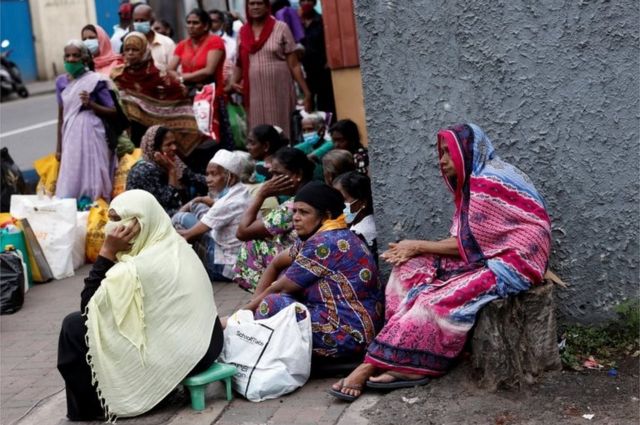
In working-class neighbourhoods, families have begun to band together around wood fire stoves, to prepare the simplest of meals – rice, and coconut sambol.
Even dhal, a staple of the diet all over South Asia, has become a luxury. Meat? At three times the price it used to be? Forget it.
Fresh fish was once abundant and affordable. Now, boats can’t go out to sea, because there is no diesel. The fishermen that can go out sell their catch at vastly inflated rates to hotels and restaurants out of reach to most.
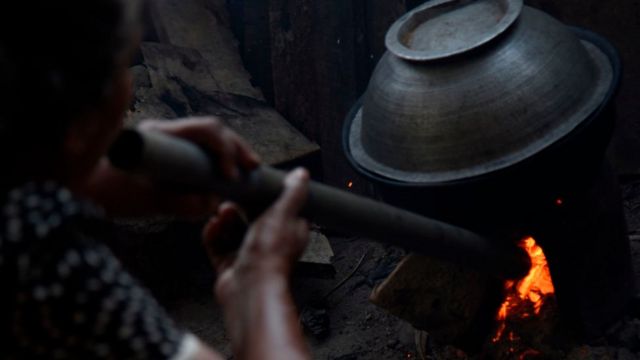

Sri Lanka: The basics
- Sri Lanka is an island nation off southern India: It won independence from British rule in 1948. Three ethnic groups – Sinhalese, Tamil and Muslim – make up 99% of the country’s 22 million population.
- One family of brothers has dominated for years: Mahindra Rajapaksa became a hero among the majority Sinhalese in 2009 when his government defeated Tamil separatist rebels after years of bitter and bloody civil war. His brother Gotabaya, who was defence secretary at the time, is now president.
- Now an economic crisis has led to fury on the streets: Soaring inflation has meant some foods, medication and fuel are in short supply, there are rolling blackouts and ordinary people have taken to the streets in anger with many blaming the Rajapaksa family and their government for the situation.

A majority of Sri Lankan children have now been forced to subsist on a diet with almost no protein. This is a crisis that has hit on every level from the macroeconomic to the molecular.
Are children’s brains, their organs, their muscles, their bones, getting what is required? Milk powder, most of which is imported, has barely been seen on market shelves for months.
The UN is now warning of malnutrition and a humanitarian crisis. For many here, the crisis has been roiling for months.
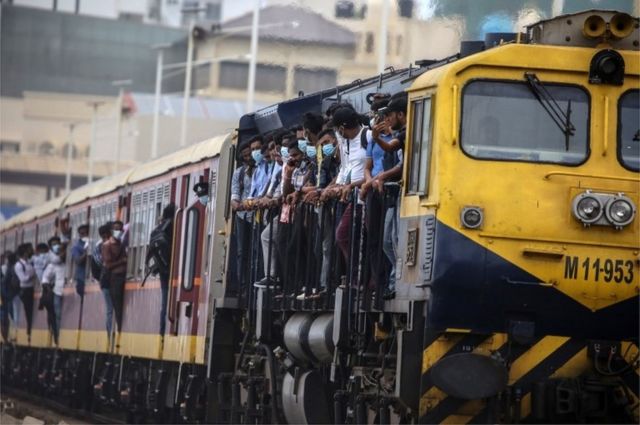
Those who can find rides generally commute on buses and train carriages bursting with evermore passengers.
Young men cling for their lives on the footboards, while the mashed throng inside gasps for air.
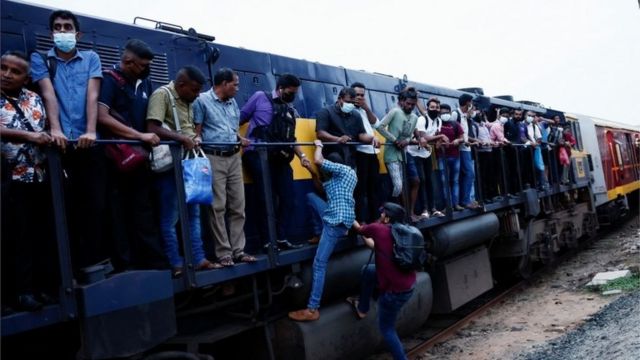
For decades Sri Lanka has failed to invest appropriately in its public transport, while the island’s wealthier residents continued to complain about the indiscipline of bus and trishaw drivers.
There is a growing view that it’s this perceived disdain for regular people from both the political and financial elites that has brought the nation to its knees. And yet it’s the lower-middle and working classes that must bear the worst of the economic collapse.
- ‘Living in my car for two days to buy fuel’
- Sri Lanka: ‘I can’t afford milk for my babies’
- What’s behind Sri Lanka’s petrol shortage?
- How war heroes became villains
Private hospitals continue to function, albeit less well than they used to. In North Central Anuradhapura, a 16-year old who had suffered a snakebite died as his father rushed desperately from pharmacy to pharmacy to look for the anti-venom the public hospital had run out of.
The healthcare sector can no longer afford many lifesaving medicines. In May, a jaundiced two-day-old died after her parents could not find a trishaw to take her to hospital.
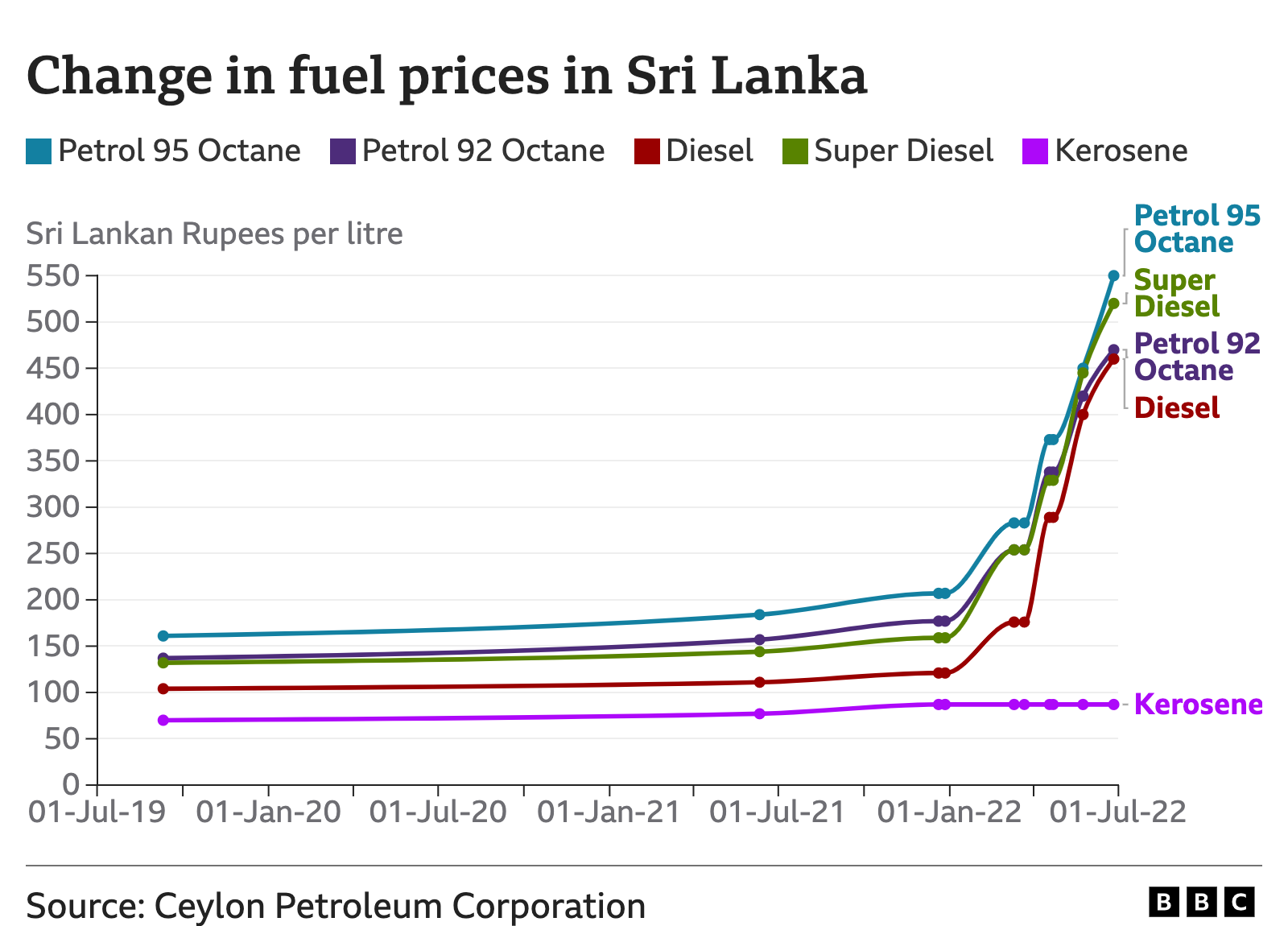
As economists have pointed out, it is the sweeping tax cuts of 2019 – lobbied for and cheered on by many corporate and professional groups – that contributed to emptying Sri Lanka’s coffers, and helped bring the nation to this brink.
On the black market, fuel can still be bought at vastly inflated prices, some of it to run the larger private vehicles, and home electricity generators.
Lower down the economic ladder, people attempt to buy bicycles to make trips into work, and find the exchange rate has put even that form of transport out of reach.
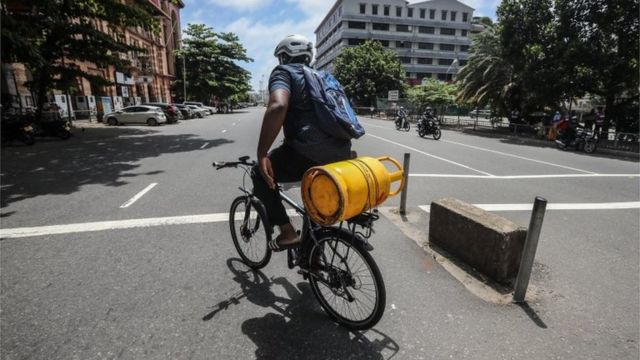
It had been the worst of the power cuts that set off Colombo’s major protests, late in March. Back then, the 13-hour daily outages had left a nation exhausted in the hottest weeks of the year.
That fatigue had sparked widespread fury, and a crowd of thousands descended on the eastern Colombo suburb of Mirihana, where the president resides.
Of all the demonstrations in the country over the past year, this was perhaps the most visceral. A man in a motorcycle helmet made a speech railing at the political forces, clergy and media that had delivered the nation into the hands of what was now widely perceived as simultaneously the most self-serving and inept government here in generations.
Later, that man, Sudara Nadeesh, was beaten brutally by the police and arrested, along with several dozen others who suffered the same violent fate.
Sri Lanka had been strung up in a 26-year civil war, but even through that unspeakably violent stretch, the island has never had a president so close to the military’s top brass as former defence secretary Gotabaya Rajapaksa.
The south has found out in the past few months, what northerners have known for decades: dissent is routinely met with state violence.
In recent months largely peaceful protesters have had live rounds shot into their midst, tear gas has been indiscriminately fired at crowds in which small children were present. In queues for essentials, the mildest shows of displeasure have been met with brutal beatings.
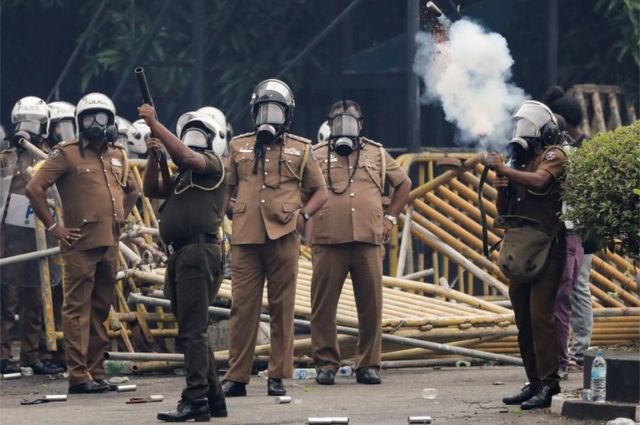
Police say some officers suffered injuries when stones were thrown, but as protesters have lost lives, or ended up in hospital, the police response has been viewed as being wildly disproportionate.
On social media, politicians offer sympathy, posting photos of the public’s hardship while asking for change. This has mostly only inspired more outrage. Was it not the politicians who led us here?
And yet, while nationwide protests have called for the removal of the president and his cohort, they remain obstinately in place, their perceived disdain for the public’s will evident in the backroom deals that many feel continue to poison the island’s politics.
The same leaders accused of crashing Sri Lanka into this ravine insist that only they can lift the island out again, and the policies they devise are met with sharp criticism.
There is now a concerted push, for example, to send more Sri Lankans overseas to work as housemaids, drivers and mechanics in the Middle East, with those emigrants expected to send their earnings home.
This may only deepen the hardship of many of its most vulnerable citizens, as poor Sri Lankans with no hope of finding local employment are forced to leave their families for nations in which they have few protections and little agency. One anthropologist online described this vision for Sri Lanka in stark terms: “the vampire state”.
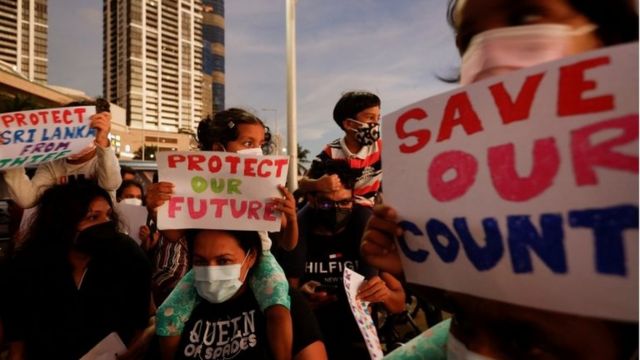
By evening in Sri Lanka’s crisis, you’re drained beyond imagination. Beyond the almost impossible commute because of the lack of petrol and diesel, the everyday functioning of a workplace has itself become a relentless onslaught of crises, with supply chains having broken down, most potential customers having long since refused to spend on anything but essentials, and staff failing to show up.
Then late-night power cuts come again, and you survive on lighter evening meals with each passing week, unable to buy enough food for your home, unable to cook what little you’ve bought, unable to give your parents their medication, or your children the education they deserve.
Schools are presently shut, as there is no fuel to take them. Classes are online for the third year running.
The government continually fails to deliver what little it’s promised, relatives and neighbours call to ask for money you don’t have to spare, the police and military bear down on what little hope remains, and through all this you’re still grateful, because many around you have it so much worse.
Last week, a mother threw herself and her two children into a river.
Every day, a fresh heartbreak.
Andrew Fidel Fernando is an award-winning author and journalist, based in Sri Lanka.
Train fares to increase from Tuesday – minimum fare is Rs 20
It is reported that it has been decided to increase the railway fares from next Tuesday. Railway department sources say that the related legal procedure is currently being prepared and the work will be completed by Sunday.
The rail fares will be revised up to half of the current regular passenger bus fare and the minimum fare will be increased to Rs.20.
The railway department proposed on several occasions to increase the train fares as the fuel prices have gone up, but it was not approved.
By now the bus fares have increased to the level that the people cannot bear and therefore the number of passengers using the train has increased. They will face further hardship through hike in railway fares.

